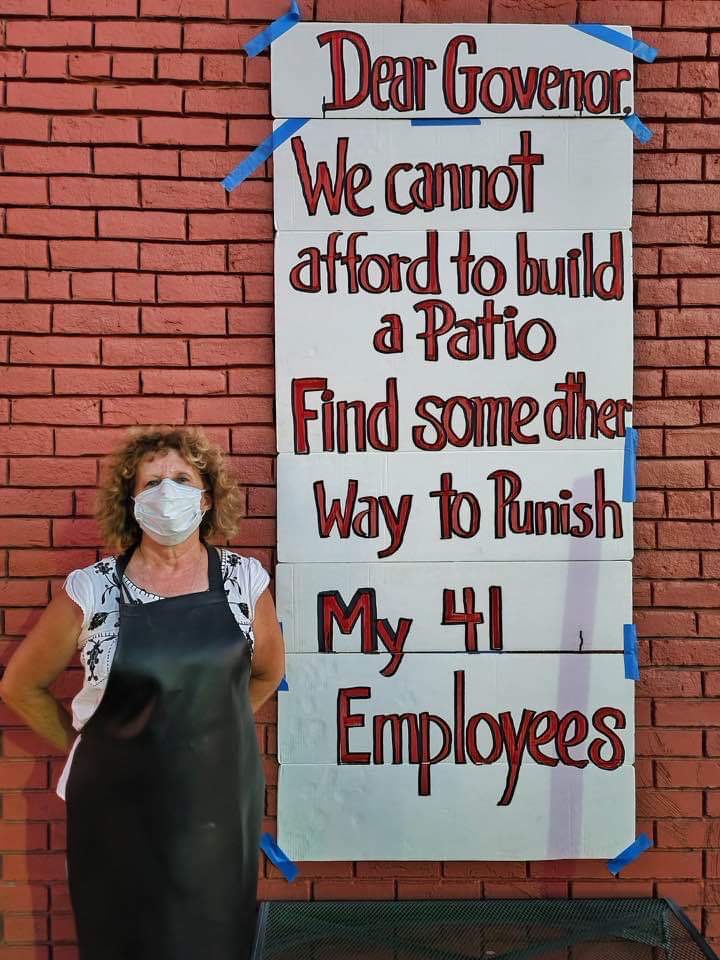Gallup's Wild Sage Coop is a small, volunteer-run store that originally reached out to Albuquerque's Coop for help with running their business. The half-dozen volunteers were sharing the entire burden of running the business and when they realized how much more work would be required to make the store successful, they decided to take a different approach. By merging with La Montañita, Wild Sage would move to a new location, install new equipment and hire a paid staff, giving the volunteers a break.
More importantly, the merger would convey the benefits of La Montañita's membership in the Coop Grocers Association. The association negotiates as a group for lower prices, allowing individual coops to compete with local chains. In addition, Pugh explains, “the major distributors have volume brackets, so the more you buy the less you pay. We're probably about 3/4 of the way up the ladder—so to speak— whereas Wild Sage, well, Wild Sage wouldn't even be on the ladder. So should that and the Santa Fe opportunity come through, the additional volume [of our purchases] would bring us up a couple brackets and our costs would go down about 2 percent.”
Merging with La Montañita wouldn't transform Wild Sage into a warehouse store; it would remain a small natural foods haven, one that is meant to be self-sustaining, not subsidized by the Albuquerque stores. The market survey commissioned by La Montañita calculates that there is from $10,000 to $12,000 worth of business to be had every week in Gallup, and though La Montañita would invest around $200,000 in equipment and initial inventory, they estimate it would take only take a few years for that money to be recouped.
But if the goal of a Gallup Coop would be merely to support itself, not make money, why would La Montañita be interested in merging with them? “This is not a project that we considered to make money,” Pugh says, “it was to save a coop that wasn't going to be able to make it.” Talk like that sounds either foolish or suspicious until you remember: Coops aren't like regular businesses. There are no CEOs siphoning off million dollar bonuses. For La Montañita's board and members, helping out a failing coop is practicing what they preach. “We believe strongly in the benefits that coops bring to communities,” Pugh says, “Somebody's got to help them.”
La Montañita's membership has approved the move and Wild Sage formally approved the action last week. The two groups will start work immediately with the selection of a new location.
At the same time, Albuquerque's coop was approached by Jill Markstein, owner of The Marketplace Natural Grocery in Santa Fe. The Marketplace is the capital's only locally owned and operated natural foods grocery; it was opened by Markstein and her late husband back in the early '80s. Over the past 22 years of business, The Marketplace has seen competitors come and go, but recently the pace has quickened. Santa Fe is now home to big-time national names like Wild Oats, Whole Foods and Trader Joe's. According to C.E. Pugh, The Marketplace has struggled compete with the chains' buying power, surviving this long only because of an extraordinarily dedicated customer base. After a career in the business, Markstein is looking to retire but wants to ensure that the store continues to serve Santa Feans who want to shop at a locally owned store. That's where she hopes La Montañita Coop will come in.
“The store is still enjoying great success, even with Trader Joe's, Wild Oats and Whole Foods. We don't need to resurrect it—it's fine and healthy. Otherwise we wouldn't even look at it,” Pugh explains. Markstein and La Montañita's board of directors have scheduled a series of community meetings in Albuquerque and Santa Fe to solicit feedback on the proposed merger.
If approved, the Marketplace's 50 employees would be invited to stay on with the renamed Marketplace Coop. By merging with La Montañita, The Marketplace would allow Markstein to pursue other opportunities, while giving the smaller store the same increased buying power—and hopefully lower prices—it will need to continue to compete in a saturated market.
Other than the benefit of negotiating a little bit lower prices with vendors, what would La Montañita gain from these two proposed mergers? “For us,” Pugh says, “it's about practicing what we preach, walking the walk. We believe strongly in the benefits that coops bring to communities.” The inability of smaller stores to compete with national chains means that they're a dying breed. “Somebody's got to do something,” Pugh says. There has been growth in coops around the country, he says, but right now that growth is coming from projects like these two, from coops helping other coops or like-minded enterprises.
The Coop is acutely aware of the changes it will face in growing larger and extending its reach. In discussions of the proposals, the members have asked themselves, “If there's a way we can participate in expanding cooperatives in such a way that it still maintains our values and our integrity?” Pugh says he talks to a lot of other big coops and is confident that these issues can be resolved, “because none of us wants to duplicate corporate expansion. No one here.”
La Montañita is also feeling the pressure from members to open a third Albuquerque location. The Northeast Heights and Downtown are the two parts of the city clamoring loudest. General Manager Pugh says that investing in Wild Sage and The Marketplace would have little impact on the possibility of another Albuquerque La Montañita. The investment they made in opening the North Valley location was about $1.5 million. Merging with the Gallup and Santa Fe stores would likely cost less than a quarter of that and be recouped faster.
Over the summer Coop members looked at various areas of the city, including a site Downtown. Pugh emphasized that they're just looking and that the process of opening a new store would be slow and methodical. “Unlike with a corporation, everything we do is transparent. And we like process, we like to talk about things.” Any possible Albuquerque opening would have to go through a market study and an examination of the finances involved before moving to community meetings and the approval of the membership. All that takes time, but they aren't feeling rushed.








